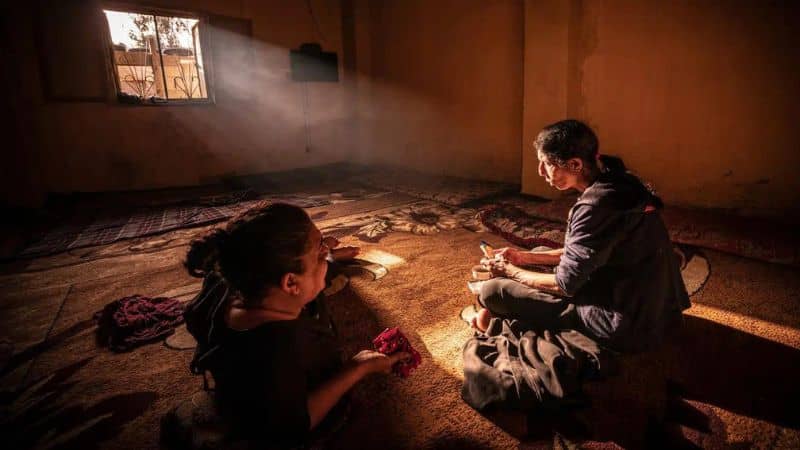When the massive explosion of ammonium nitrate in a storage warehouse at the Port of Beirut occurred in August 2020, wreaking extensive damage across the capital and exacerbating food and supply shortages, the global news media reacted in shock to what seemed an excessively cruel blow for a city already on its knees after years of corruption and economic mismanagement.
Lebanon’s once-comfortable middle class were pushed further toward desperation, with the number of citizens suffering in poverty rising to 82 percent, a figure almost doubled within two years. But, as Irish documentarians Stephen Gerard Kelly and Garry Keane point out in their portrait of four families In the Shadow of Beirut, screening at the festival Docs Ireland this month, the most marginalised and economically disenfranchised sector of society did not feel the same earth-shattering impact from the disaster and deepening crisis — because they had already been in a grinding struggle for basic survival for some time.

Life in Sabra and Shatila
The filmmakers started shooting in Sabra and Shatila, a neglected neighbourhood and the adjacent Palestinian refugee camp southwest of Beirut that is home to the displaced and down-and-out, in 2018 to garner a sense of who makes up this community and the government policies that perpetuate oppression and a pervasive inability among those stuck there to transcend the lack of opportunities.
The port catastrophe sets the scene in the documentary for a humanitarian crisis in Lebanon that, already entrenched, is widening, compounded by the pandemic and its lockdowns. The glossily packaged documentary is executive-produced by Hillary Clinton (which may raise the odd eyebrow, given her hand in the funnelling of arms to the Syrian war, which some of the film’s refugees have fled from, when she was US Secretary of State in the Obama administration) and her daughter Chelsea, through their company HiddenLight Productions. It eschews setting out a great deal of specific political context, analysis of responsibility or prescription for change, opting instead for a humanistic vision of individuals fighting for fundamental living conditions and dignity, which feels somewhat generic in its framing of this destitution for paternalistic western empathy, but effectively captures something of the demographics of hardship and displacement of this densely crowded corner of the Middle East.
Lebanon’s once-comfortable middle class were pushed further toward desperation
In shifting between the families whose daily lives they gain close access to, the filmmakers build a cumulative view of a community from which services and rights are withheld (garbage remains uncollected and ignored by the state, and permits to run businesses legally are as unobtainable as citizenship documents for the majority of inhabitants.) The loose back-and-forth winding between households can make it hard to distinguish who lives where, but in the cramped quarters of this district, where everyone is hanging by a thread of the same precarity and lacking the certainty of a secure home, it scarcely matters.

Challenges and hardships
With no government assistance and legitimate jobs, few and far between, the residents of Sabra and Shatila do whatever they can to get by and afford at least one meal per day, sending their kids out to earn what little they can contribute as well. The road to nationality is steep: even a person born, raised and living in Lebanon cannot get citizenship if their mother and not their father is Lebanese, meaning families can be shut out in perpetuity. And the pressure on children to make money from brutal necessity means they are deprived of an education and kept down by this further limitation.
Several of the inhabitants focused on are very young, in the film’s commitment to showing this deprivation as multi-generational and determined by chance fate. Abu Ahmed, whose family fled from barrel bombs in Syria, earns a meagre three American dollars per day working from seven in the morning to nine in the evening, throwing out cups at a juice stall. Sanaa, a teenager, already has a marriage proposal and agrees to a trial engagement, only to be faced with a fiance whose behaviour changes radically after several months due to a spiralling drug problem (addiction issues are rife among men in the community, getting high being one of the only short-term respites from the pressures of their hardscrabble lives.) Aboodi Ziani has come out the other side from stints in prison for robbery and drug dealing, but his criminal record has made conventional employment even more out of reach, stifling his options and capacity to reintegrate. One family has an infant daughter, Saarea, with a severe skin disease, and the medical complications of her care add another burden of misfortune to an already impossible situation of paying for and accessing resources. One must become a wolf to avoid being eaten by wolves, according to one local — a nod to how desperation fuels societal disintegration.




